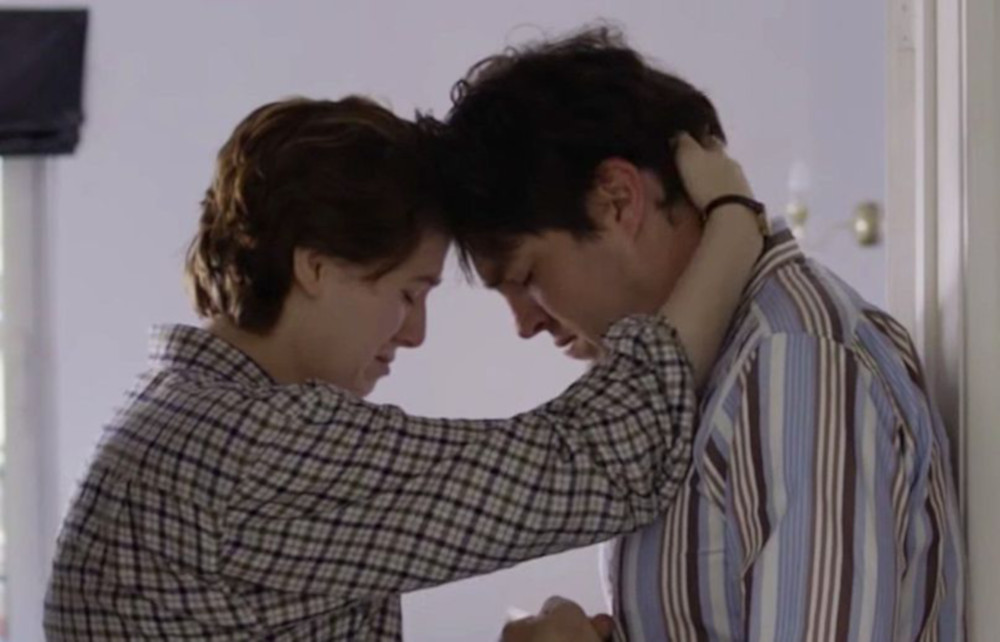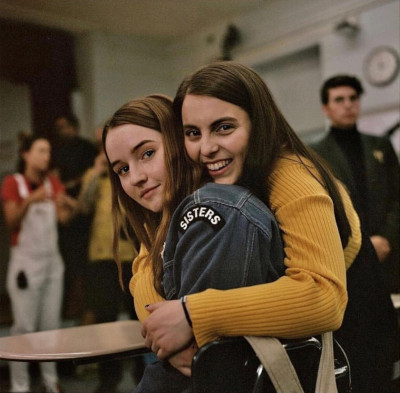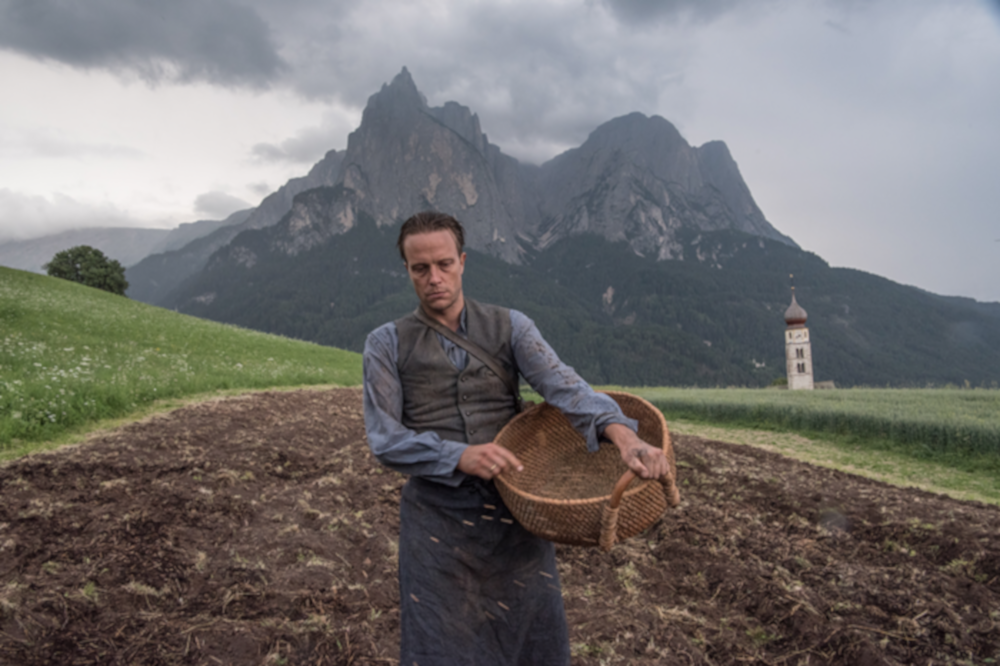So, here we are. The end of the year, the start of a new decade. At such a juncture it behooves one to look back, scratch one’s back fat and pontificate upon the passage of time.
It was an odd year in movies, reflecting the general upheaval on the planet — from political chaos to the environmental catastrophe to everyone needing to have a staunch opinion about The Irishman.
I’m not exactly sure why this particular film caused otherwise reasonable people to lose their damn minds, but, as Manohla Dargis pointed out in the New York Times, it was the year of male crisis, with men of the species having ongoing freakouts about their relevance, importance and other penile stuff.
The Lighthouse, Ford v Ferrari, Once Upon a Time in Hollywood, Joker, The Two Popes and even Mr. Rogers going full Daddy Dearest in A Beautiful Day in the Neighbourhood were enough to convince anyone with a working set of eyeballs that something was up with men. While women, both in movies and in real life, were trying to get on with things, a great many men craned their heads so far up their own asses they apparently got stuck up there. So, while men figure it out, let’s move on to other things.
There were some terrible disappointments this year. I am pretty undemanding when it comes to Star Wars, but the latest iteration might convince you that J.J. Abrams forgot how to make movies. Overblown and underdeveloped all at the same time, The Rise of Skywalker actually achieved the feat of being deeply boring.
Not since interplanetary trade disputes took over the plot of The Phantom Menace have I seen an audience so visibly wilt in a theatre. You could almost see the cloud of befuddlement gather over people’s heads as they tried (in vain) to make out the painful plot. Worse was the sense that all of the characters were strange imitations of themselves, like Invasion of the Body Snatchers had somehow jumped the space shark and taken over Kylo Ren and Rey. Perhaps in another 10 years we will be ready for the next installment in the Star Wars universe, but more likely we’ll have other concerns, like growing gills and learning how to swim as the waters rise here on planet Earth.
While every critic has gone claws out for Cats or had a he said/she said moment in Marriage Story, there were lots of other films this year that deserved some time and attention. Sometimes one moment was enough for a film to endear itself. Dakota Johnson merrily giving Shia LaBeouf the finger in The Peanut Butter Falcon, a film remarkable mostly for the amount of time no one wears a shirt. Or LaBeouf playing his own evil clown of a father in Honey Boy. Again, daddy issues were big this year.
Despite being largely left off the awards ballots, women filmmakers offered up some of the best films on offer, including Jennifer Kent’s The Nightingale, Joanna Hogg’s The Souvenir, Greta Gerwig’s Little Women, Lorene Scafaria’s Hustlers, Olivia Wilde’s Booksmart, Lulu Wang’s The Farewell, Céline Sciamma’s Portrait of a Lady on Fire, Claire Denis’s High Life and, of course, the late great Agnès Varda’s Agnès on Varda.
A great many of these films are screening in Vancouver’s Vancity Theatre as part of its Best of 2019 Series. Over at the Cinematheque, curators Shaun Inouye and Jim Sinclair have expanded the scope, offering their favourite films from the decade. It is a delectable cornucopia of cinema, and the temptation to gorge shouldn’t be resisted but wildly indulged.
Here’s just a smattering of deserving movies to watch over the holiday season.

Anyone who lived through the 1980s and the bad relationships therein might watch this film between their fingers. It is beautiful and painful in equal measures, a doomed love story meted out in series of exquisitely calibrated scenes. Newcomer Honor Swinton Byrne (the daughter of acting royalty Tilda Swinton) plays Julie, a young woman of great privilege and terrible fragility. There is specificity to the time, place and era of the film, based on director Joanna Hogg’s own experience, but there is also remarkable universality. It reminded me, with almost agonizing detail, what first love with an older (complicated) man can do to a young soul. It’s a truly staggering achievement that walks the razor edge of grief and love with the precision of an aerialist.
This is a film that reminds one that Adam Sandler can actually act. So why hasn’t he been doing this kind of stuff for the past 20 years? Beats the hell out of me. The film is filled to the brim with real New York characters — could anyone actually make up someone like Wayne Diamond? — and the Safdie Brothers have crafted a corrosive love song to the hustlers, grifters and rancid mad risk takers who made America great. Also, it’s just nice to see Eric Bogosian back on the big screen again.
Petra Costa made an extraordinary documentary about her sister’s death a few years ago. In her latest film she looks at the death of democracy in Brazil. Costa has a painterly way with film, and in dealing with her homeland’s history, turmoil and tragedy she is working on an epic scale. At the same time, the film is burnished with smaller intimate details of family, parents, grandparents and children caught up in the grinding engines of history.

I know I’ve yammered on about this film, but it felt decidedly new, from the pair of friends at the centre of the story to the celebration of female intelligence, ambition and loyalty. Gender-neutral bathrooms, sexual fluidity and all-round bonhomie mixed with good old-fashioned teenage horniness — what’s not to love?
The Last Black Man in San Francisco
Lovely, elegiac and a wee bit house porny, director Joe Talbot’s study of friendship felt like a story suspended in time, like something caught in a bubble of amber. The Fillmore District of San Francisco provides the setting and the impetus for a tale of two friends — Jimmie (Jimmie Fails) and his friend Mont (Jonathan Majors), both searching for a sense of home and meaning. Based on screenwriter Fails’ experience of growing up in the city on the bay, The Last Black Man in San Francisco possessed a rare quality of being deeply authentic and idiosyncratic at the same time. I haven’t seen anything quite like it.
A lot of critics did not much care for director Taika Waititi’s comedic take on the Second World War, Nazis and an imaginary friend named Hitler, but I actually kind of liked this film and its peculiar mixture of sadness and sweetness. Also, its bevy of ’40s style hats perched atop the apex of Scarlett Johansson’s head. Yes, it’s silly and occasionally questionable in taste (oh those hilarious Nazis!) but despite a few misfires, the film had an amiable way about it that wormed its way into my affections.
The Body Remembers When the World Broke Open
Just as I was tempted to throw my hands in the air over the miserable state of Canadian narrative cinema, along came Elle-Máijá Tailfeathers and Kathleen Hepburn’s stunning feature. Shot in Vancouver and co-starring Tailfeathers and newcomer Violet Nelson, the film did something miraculous, capturing not only the atmosphere and air of the city itself but also the ineffable, often silent mysteries of female experience and communion.

If I had to pick a film, other than Bong Joon-ho’s Parasite, that summed up the previous year it would be Terrence Malick’s A Hidden Life. Malick, like a lot of other filmmakers of a certain age and inclination, can be insanely self-indulgent, and a great many of his tics and schtick are on full display in this new film. But at its core is a diamond-hard chunk of truth about how difficult it can be to do the right thing.
The story is based on the life of Franz Jägerstätter, an Austrian conscientious objector who was killed when he refused to swear a loyalty oath to Hitler. Franz (August Diehl), his wife Fani (Valerie Pachner) and their three small children live a simple life as farmers in a small rural village. They cut hay, milk cows and plant potatoes; it’s so bucolic it’s practically beatific. But the drumbeats of terrible happenings, embodied by the thudding roar of Messerschmitt fighter planes, herald change.
Watching the film, with its swirling dappled beauty akin to sunlight caught and fractured in swaying trees, leaving coronas of colour caught behind your eyes, it’s hard not to simply be overwhelmed by the pure visual splendour. There is something of the ecstatic in the dance of changing seasons, the cleft of mountains and valleys coming together, the arc of the sky carved against the earth, the physical joy of love, all of it cast against the looming shadow of despair and suffering. Although Malick lets loose with many of his usual flourishes, for pure untrammelled loveliness the film is hard to beat.
But a few scenes of brutal honesty anchor its lushness. In the middle of the film, Franz visits a church and talks to a painter. It’s a short scene, but it sums up a great deal of the things that we’re faced with at the moment — hypocrisy, cowardice, corruption, all embedded in the art we make and the politics we fight over. Says the painter, while touching up an image of Christ painted on the church ceiling: “They look up and imagine that if they’d lived back in his time, they wouldn’t have done what the others did. They would’ve stood by him. They wouldn’t have run. His friends did, though. They would, too.”
It isn’t simply maintaining your moral position in the face of people who hurt and abuse you. But the film’s profound and almost unbearable emotional weight comes from its look at the challenge of resisting the entreaties of the people who love you the most.
A Hidden Life is a story for the ages, best summed up by the quote from George Eliot’s Middlemarch that provides its title: “The growing good of the world is partly dependent on unhistoric acts; and that things are not so ill with you and me as they might have been, is half owing to the number who lived faithfully a hidden life, and rest in unvisited tombs.”
On the eve of a new decade it’s tempting to think that after 10 years we humans might’ve solved a few problems. In fact, some things did get better, and then intractable issues crowded into the empty space left behind. Sometimes it feels like maintaining hope is a bit foolish. In this films can help, offering small pleasures, a scene here, a snatch of atmosphere there, and the opportunity to live in another life for a while. This can be a great blessing. Movies have buoyed me through a number of dark patches. A SAD lamp for the soul, cinematic chicken soup, whatever you would like to call it.
So here’s to the coming year and a new decade. Let’s try to be good to each other, and to our sad old beautiful world.
Happy holidays, readers. Our comment threads will be closed until Jan. 2 to give our moderators a break. See you in 2020! ![]()
Read more: Film















